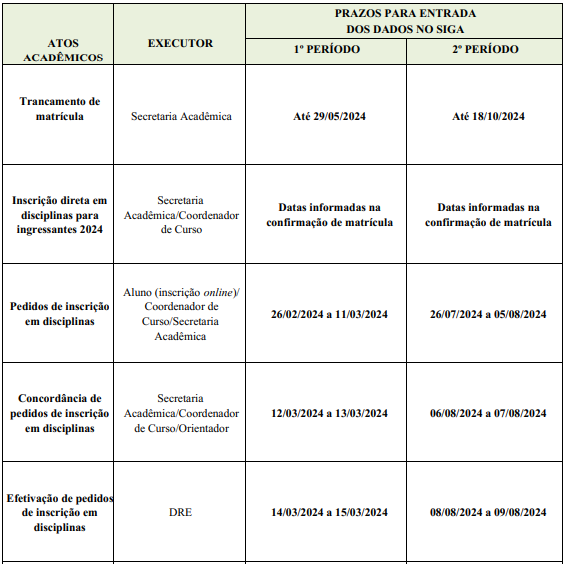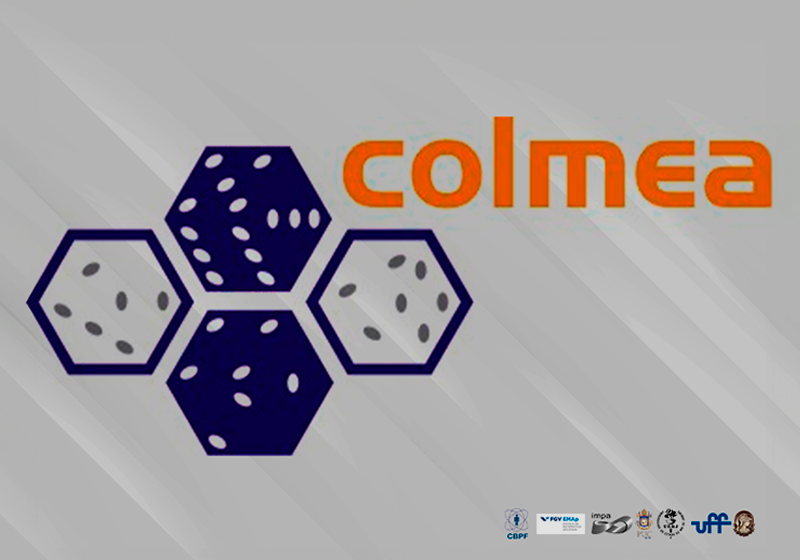
Entre os dias 26 de fevereiro e 11 de março de 2024, estará aberto o período destinado à inscrição em disciplinas na Universidade Federal do Rio de Janeiro (UFRJ).
Solicita-se a atenção dos interessados para que não posterguem este compromisso até o momento derradeiro.
Para mais infomações, clique aqui.
INFORMAÇÕES PRINCIPAIS


Título: Dinâmica de Germes de Difeomorfismos Analíticos Complexos em uma Variável
Palestrante: Renzo Anthony Pino Espinoza
Data: 28/02/2024 de 10:00h às 12:00h
Horário: 10:00h às 12:00h
Fuso Horário: América/São Palulo
Local: Transmissão online
Link da videochamada: https://meet.
 O COLMEA - Colóquio Interinstitucional Modelos Estocásticos e Aplicações - Dia 31 de janeiro de 2024, a partir das 14:00h, no IM-UFRJ, Sala C-116. Será o primeiro encontro deste novo ano e aproveitamos para desejar a todos um Feliz 2024. Nesta ocasião teremos as palestras dos Professores Helcio Orlande (Programa de Engenharia Matemática - COPPE/UFRJ) e Béla Bollobás (University of Cambridge e University of Memphis)
O COLMEA - Colóquio Interinstitucional Modelos Estocásticos e Aplicações - Dia 31 de janeiro de 2024, a partir das 14:00h, no IM-UFRJ, Sala C-116. Será o primeiro encontro deste novo ano e aproveitamos para desejar a todos um Feliz 2024. Nesta ocasião teremos as palestras dos Professores Helcio Orlande (Programa de Engenharia Matemática - COPPE/UFRJ) e Béla Bollobás (University of Cambridge e University of Memphis)
Programa:
14:00 - 15:20 Helcio Orlande (PEM COPPE/UFRJ) - State estimation and predictive control applied to the treatment of the hypoxic-ischemic encephalopathy in neonates
15:40 - 17:00 Béla Bollobás (Univ. of Cambridge and Univ. of Memphis) - Sum-set problems and results -- Old and new
17:00 - Discussão e lanche
Local: Sala C-116
Informações mais completas sobre o COLMEA podem ser encontradas AQUI!
Atenciosamente,
O comitê organizador:
Americo Cunha (UERJ)
Evaldo M.F. Curado (CBPF)
João Batista M. Pereira (UFRJ)
Leandro P. R. Pimentel (UFRJ)
Maria Eulalia Vares (UFRJ)
Nuno Crokidakis (UFF)
Roberto I. Oliveira (IMPA)
Simon Griffiths (PUC-Rio)
Yuri F. Saporito (FGV-EMAp)
State estimation and predictive control applied to the treatment of the hypoxic-ischemic encephalopathy in neonates - Helcio R. B. Orlande (Programa de Engenharia Mecânica, COPPE-UFRJ)
The hypoxic-ischemic encephalopathy in neonates is a neurological disorder characterized by the lack of oxygen (hypoxia) and low blood flow (ischemia), often related to perinatal asphyxia due to complications during birth. The main treatment for hypoxic-ischemic encephalopathy in neonates is the cooling of affected regions. Systemic cooling can be achieved by wrapping the body of the neonate with a blanket containing channels through which cold water is circulated. Alternatively, local cooling can be performed by surrounding the head of the neonate with a cap, in which cold water flows through channels, while the remaining body can be warmed by a radiator in the incubator. This seminar summarizes the works recently performed by the authors on the solution of inverse problems and predictive control related to the hypothermia treatment of the hypoxic-ischemic encephalopathy in neonates. The inverse problem involved the estimation of the brain temperature from the information provided by other temperature measurements available during the treatment. The inverse problem was solved as a state estimation problem with the Sampling Importance Resampling (SIR) algorithm of the particle filter method. The solution of the inverse problem was verified with simulated measurements, and ultimately validated with actual experimental data obtained during the local cooling treatment of a neonate in a pediatric intensive care unit. The combined application of the particle filter method and stochastic model predictive control was also numerically examined, in order to observe and control the body temperatures during the cooling treatment of a neonate.
Sum-set problems and results -- Old and new - Béla Bollobás (University of Cambridge and University of Memphis)
Sums of subsets of R^n, Z^n and Z_p^n have been studied for well over a century, although at the beginning progress was very slow. The subject took off in the 1960s, when Erdos and Heilbronn, and Freimann published their celebrated papers, and has been going from strength to strength with the results of Gowers, Green, Károlyi, Ruzsa, Tao, Vu and others. The talk, which should be understandable to a wide audience, not only to pure mathematicians, will contain some of the results I have obtained with Imre Leader and Marius Tiba, together with a recent breakthrough achieved by Gowers, Green, Manners and Tao.
 Time optimal controls for infinite dimensional systems
Time optimal controls for infinite dimensional systems
January 24, at 12:00 p.m. (Rio de Janeiro local time)
Local: room C116 - Bloco C - CT – Instituto de Matemática – UFRJ. There will be no transmission online.
Speaker: Sorin Micu - (Universidade de Craiova)
Abstract: We consider the time optimal control problem, with a point target, for an infinite dimensional system described by the Kirchhoff plate equation with distributed control. We prove that time optimal controls have a bang-bang property and, consequently, that they are unique. The main ingredients used to achieve this goal is a new approximate observability property from measurable sets for the system described by the Kirchhoff equation and an abstract result for systems with skew-adjoint generator.
 Título: Propriedade de Liouville para equações não lineares degeneradas
Título: Propriedade de Liouville para equações não lineares degeneradas
Palestrante: Disson dos Prazeres (Universidade Federal de Sergipe)
Data: 21/01/2024
Horário: 12:00h
Local: room C116 - Bloco C - CT – Instituto de Matemática – UFRJ.
Resumo: Nesta palestra, apresentaremos uma nova estratégia para obtermos a propriedade de Liouville para equações não-lineares degeneradas. Como aplicação iremos obter resultados de existência para problemas de Dirichlet.
